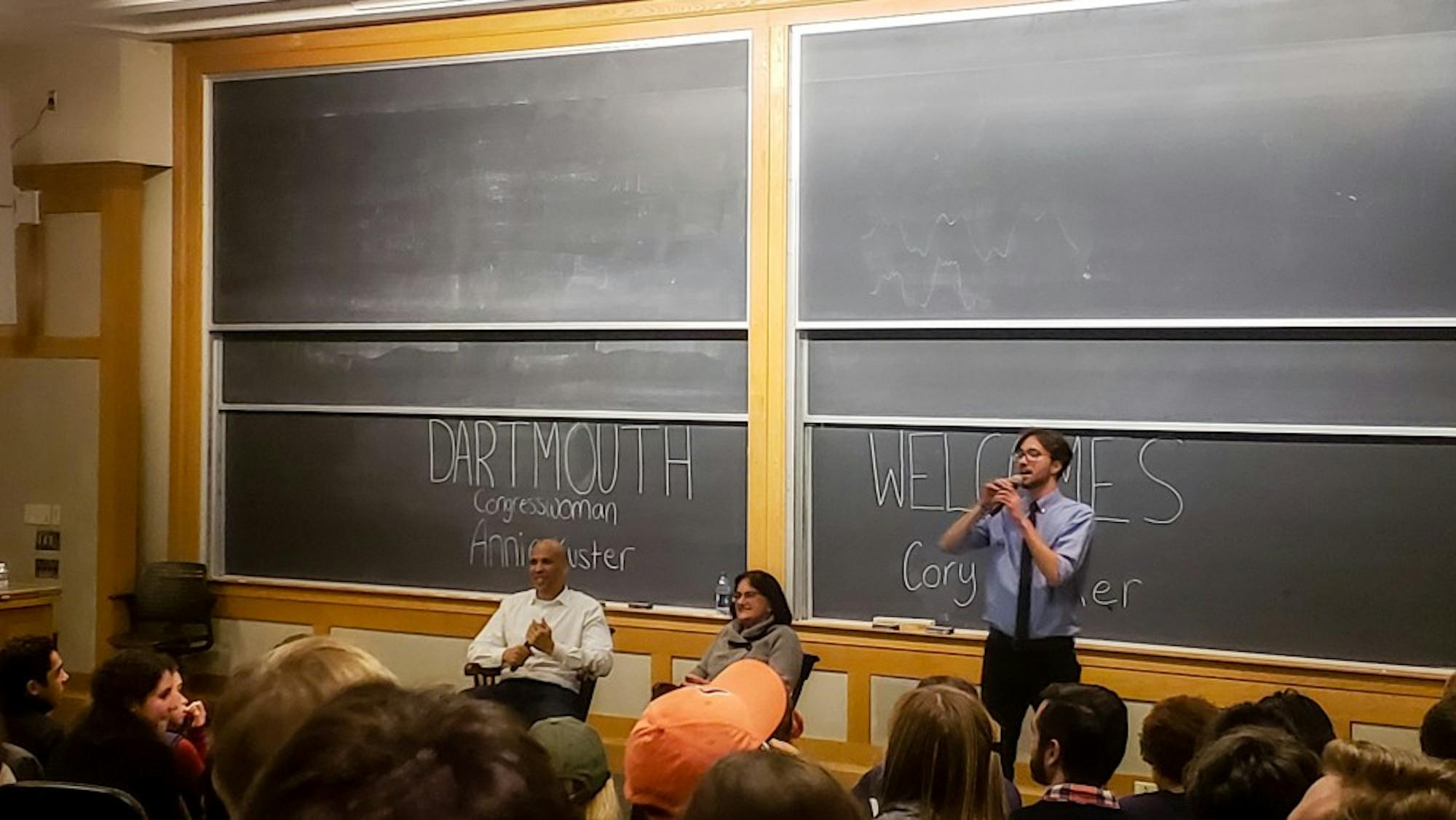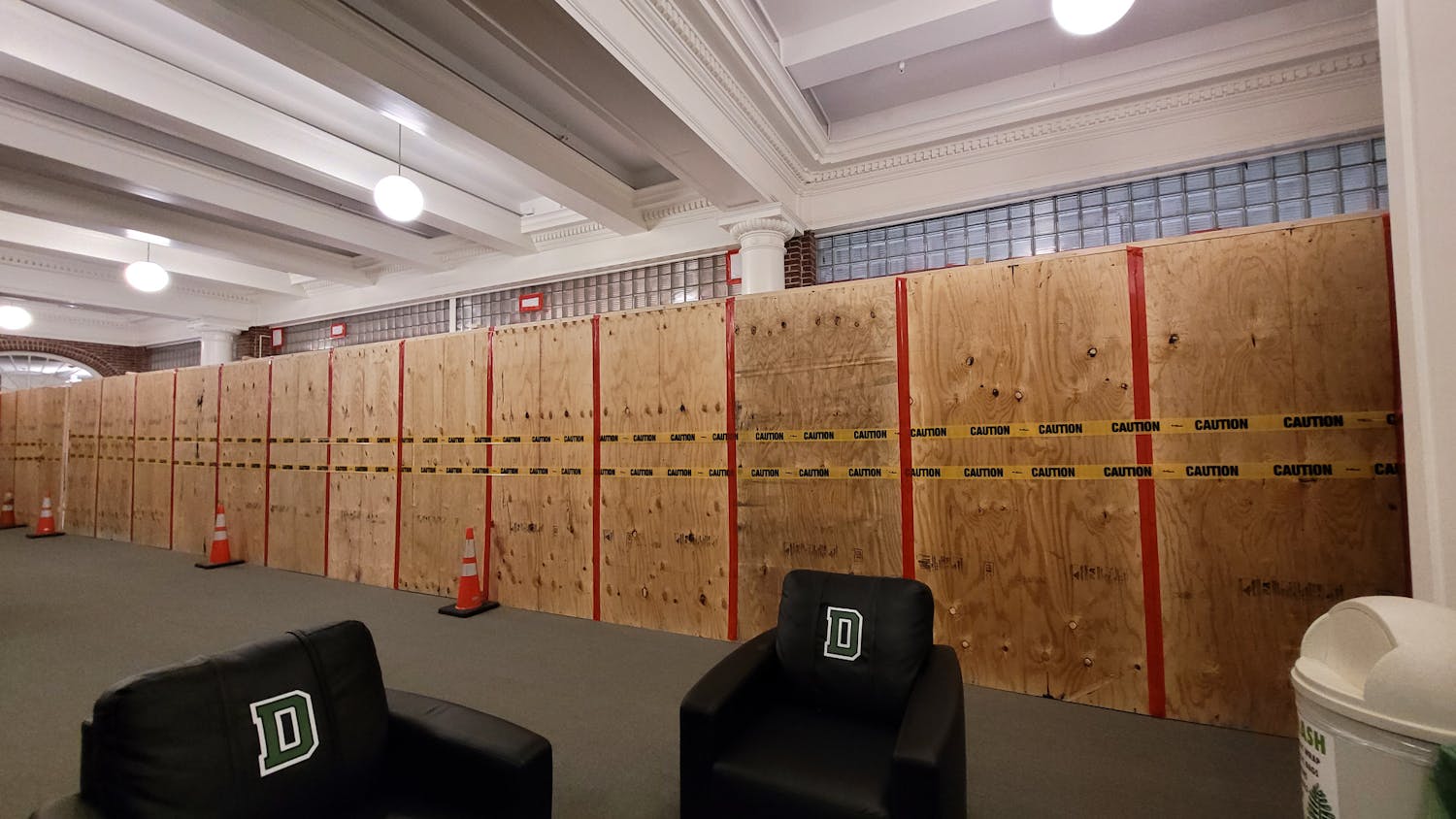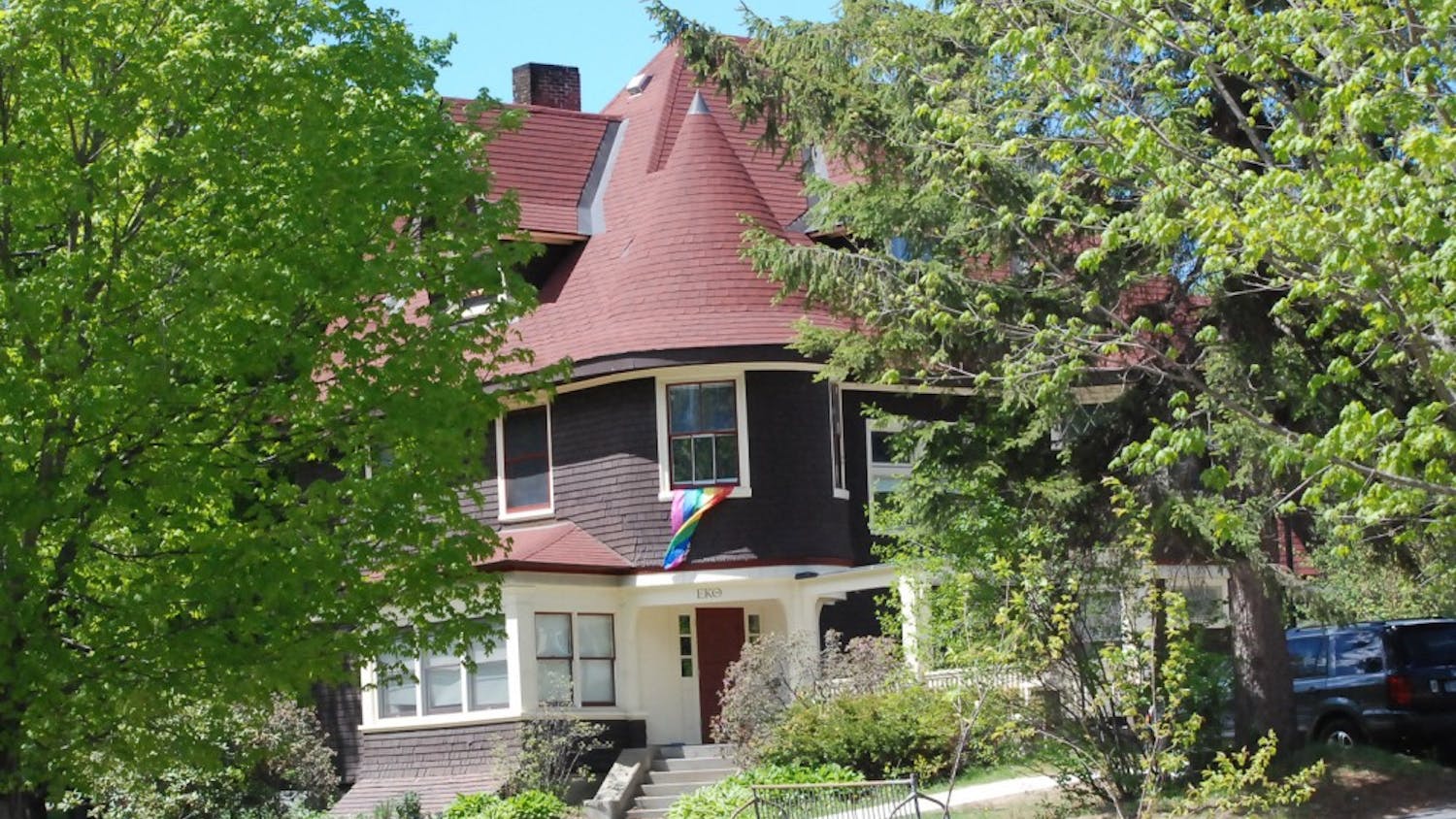As Sen. Cory Booker (D-NJ) took selfies and recorded videos with students and community members following a Get Out the Vote rally on Sunday night with Rep. Annie McLane Kuster (D-NH), a young girl approached Booker and told him that he “should run for president.” In response, Booker told her, “If I run, I want you on my team.”
Booker is considered by many to be a leading contender for the Democratic Party’s nomination in the 2020 presidential elections. On Sunday, Booker also stopped at the University of New Hampshire and headlined a fundraiser in Durham before finishing his day at Dartmouth in his first visit to New Hampshire, which hosts the first primary in the country.
When Kuster introduced Booker in front of a packed audience of over 200 people in Filene Auditorium, she jokingly referred to him as the next Democratic presidential nominee.
During the event’s question and answer period, Booker refused to say whether he planned to run for president in 2020 after a student asked him what that year meant to him, instead replying that “life is about purpose, not position.” Booker added that he had three primary purposes in life: fighting growing levels of economic inequality, combating criminal and environmental injustice, and restoring civility to the nation’s political discourse.
Booker spent much of his speech extolling the value of American virtues and emphasizing the need to bring the country together.
Throughout his speech, Booker alternated between a somber and serious figure — denouncing what he perceived as American injustices — to witty storyteller, cracking jokes and delivering personal anecdotes.
Before Booker and Kuster took the stage, Dartmouth College Democrats president Max Brautigam ’20 and New Hampshire College Democrats vice president Garrett Muscatel ’20 delivered brief opening remarks.
Muscatel will be running to represent Hanover in the New Hampshire House of Representatives next week. Running against Muscatel is Republican nominee Baronet “Webb” Harrington ’20.
During her time on stage, Kuster listed some of her policy positions, stating that she was dedicated to fighting sexual assault and ending the opioid epidemic. Kuster is running against Republican State Rep. Steve Negron and Libertarian candidate Justin O’Donnell in the state’s Second Congressional District.
Kuster urged students to vote in the New Hampshire elections, adding that the state offers same-day voter registration and that College personnel would be on hand to provide proof of residence if students live on campus.
Following Kuster’s remarks, Booker took the stage. Speaking only a day after a mass shooting that resulted in 11 deaths at the Tree of Life synagogue in Pittsburgh, Pennsylvania, Booker condemned the tragedy and added that the seeming normalization of mass shootings and other tragedies in the U.S. angered him. Booker said he was frustrated that the American public seemed “to be at peace with higher and higher levels of injustice.”
Booker also called for criminal justice reform and criticized drug laws that he said disproportionately affected communities of color.
The crux of Booker’s speech rested on the idea that the power to change the country was in the hands of every individual, with Booker stating that the “story of American history is the story of folks like us,” and not a select few individuals like Abraham Lincoln and George Washington.
He praised activists of all stripes, from the leaders of the women’s suffrage movement to participants in the Civil Rights Movement. Booker added that it was activists and young people who had helped mold the United States since its inception.
Booker said that while he acknowledges “the genius of the Founding Fathers,” he found it prudent to not “whitewash history” and to acknowledge the “bigotry and hatred” that was a component of some the U.S.’s most important political documents. He cited the mention of “savages” in the Declaration of Independence and the absence of women from the Constitution as examples.
As his speech drew to a close, Booker commented on the Kavanaugh hearings, expressing his frustration that the “world’s greatest deliberative body” did not consider all of the evidence before it. He said that Christine Blasey Ford, who had accused Kavanaugh of sexual assault, had “told her truth.”
Booker ended his speech by remarking that the actions of the people in the audience would “affect the destiny of generations not yet born.”
“Hope is the active conviction that despair will never have the last word,” Booker said. “We’ve got to have the last word.”
After Booker’s speech, he and Kuster answered questions from the audience.
Booker emphasized the importance of compensating teachers, who he said had been “devalued,” through a “massive infusion of tax breaks.”
Kuster said that making college more affordable was important and emphasized the “need to reinvest in public education.”
“The greatest natural resource is not coal, oil or gas, but the minds of the young children of this country,” Booker said.
Michael Parsons ’20, a member of the Dartmouth College Democrats’ executive board, said that students could expect more speakers like Booker after the midterm elections.
“While I don’t have specifics for exactly who’s going to be coming up here, I would imagine that Dartmouth College is going to be a hotbed of potential candidates and people exploring the idea of a presidential run in the near-future,” Parsons said.
“I think that a lot of people are going to be making the trip up to New Hampshire,” he added.
However, Parsons also noted that the main focus right now is on the midterm elections and “trying to mobilize as many people [to vote] as possible.”
“Even if you don’t think that you’re political, if there’s one issue that you believe in or that you can think about, vote on that issue,” Parsons said. “If you don’t know who to vote for, vote for who you believe will stand up for the issues that you care about.”
In an interview with The Dartmouth after the event, Brautigam said the midterm elections will could potentially impact New Hampshire voting laws, citing recent state laws such as Senate Bill 3, which will tighten the proof of residency requirements for voters who choose to register same-day, and House Bill 1264, which requires students and other part-time residents of the state to become permanent New Hampshire residents if they want to vote. While SB3 will take effect for the midterm elections, HB 1264 will not take effect until July 1, 2019. Both bills were signed into law by Republican Gov. Chris Sununu.
“If voting is important to you and you think people should have a voice in government — which hopefully anyone believes — then you’ll support the Democrats this year,” Brautigam said. “We’re the group working to make sure that people have continued access to voting rights.”
Anthony is a '20 from Dallas, TX. Anthony plans to major in Film & Media Studies at Dartmouth, and decided to join The D to further his passion for writing. In addition to working with The D, Anthony considers himself a passionate supporter of the Dallas Cowboys and spends his days watching movies, admiring fine art, and using the Oxford comma.




